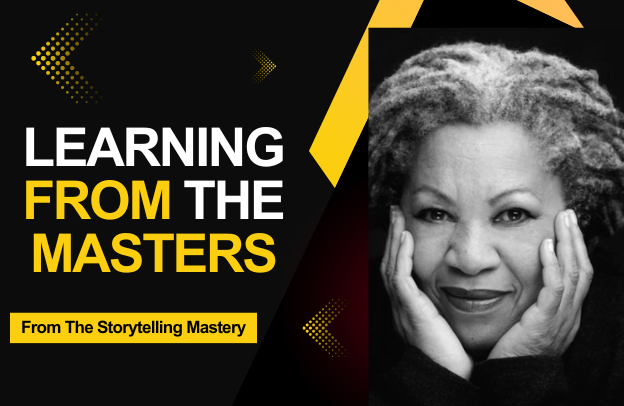Timeless Wisdom from a Trailblazer: 6 Business Lessons from Madam C. J. Walker

In an era when opportunities for African American women were scant, Madam C. J. Walker rose to become America’s first female self-made millionaire. Her journey from laundress to beauty mogul is more than a success story; it’s a masterclass in entrepreneurship, resilience, and innovation.
Want to learn more about storytelling? Start by downloading the first chapter of The Storytelling Mastery.
This article distills the top six business lessons from Madam C. J. Walker that remain profoundly relevant for today’s entrepreneurs. If that sounds like what you are looking for, then sit back and enjoy it.
Who was Madam C.J. Walker
Madam C.J. Walker, born Sarah Breedlove on December 23, 1867, was an African American entrepreneur, philanthropist, and social activist. She is widely recognized as one of the first female self-made millionaires in the United States. Her success came from the development and marketing of a line of beauty and hair products for black women through her company, the Madam C.J. Walker Manufacturing Company. At age 7, she became an orphan and later worked as a domestic servant and laundress.
Here are some of her Career and Achievements
- Hair Care Line: In the early 1900s, Walker developed a scalp conditioning and healing formula, which she claimed came to her in a dream. This led to the creation of her own hair care products, including the popular “Walker System” of hair care.
- Business Expansion: She expanded her business by establishing a network of sales agents, and training them in the “Walker System.” She employed thousands of women as sales agents, providing economic opportunities and independence for many African American women.
- Philanthropy: Walker was known for her philanthropy, donating to various causes, including the NAACP, African American colleges, and orphanages. She was also involved in the anti-lynching movement and worked to improve the lives of African Americans through her financial contributions and activism.
Madam C.J. Walker’s legacy continues to be celebrated for her contributions to African American business, her philanthropic efforts, and her role as a pioneer for women in entrepreneurship.
Her life has been the subject of various books, documentaries, and a Netflix series titled “Self-Made,” inspired by her biography. Now, here are 6 lessons from Madam C.J. Walker.
Lesson 1: Embrace Innovation
Madam C. J. Walker’s pioneering development of specialized hair care products for African American women was a game changer. At a time when no mainstream products addressed the unique hair care needs of black women, Walker identified a glaring gap in the market and seized the opportunity.
Her innovative approach involved not just creating products, but also ensuring they were specifically tailored to her community’s needs.
See also Innovative Farming Techniques for Small and Medium-Scale Farmers in Nigeria
What is the Application Today?
Modern entrepreneurs can draw from Walker’s example by staying attuned to underserved markets and niches. Innovation often comes from recognizing and addressing the unmet needs of a specific group.
For instance, many tech startups succeed by catering to niche markets overlooked by larger companies. Companies like Warby Parker disrupted the eyewear industry by offering affordable, stylish glasses online, a market segment previously ignored by traditional retailers.
In the age of rapid technological advancement, embracing innovation also means staying ahead of trends. Businesses, both within the African diaspora community and beyond must be willing to invest in research and development, and continuously improve their offerings.
This proactive approach ensures they can meet evolving customer needs and maintain a competitive edge.
Lesson 2: Empower Your Community
Madam C. J. Walker didn’t just build a business; she built a network. By establishing a network of sales agents and beauty schools, Walker provided jobs and education to thousands of African American women.
Her model was as much about economic empowerment as it was about business success.
How can you apply this Today?
Empowering your community can create a loyal customer base and a dedicated workforce. Modern companies like Patagonia and Ben & Jerry’s thrive by aligning their business goals with social and environmental causes, thereby creating a strong bond with their communities.
Social entrepreneurship, where businesses aim to solve social problems, has gained traction. For example, TOMS Shoes started with a one-for-one model, donating a pair of shoes for every pair sold. This not only addressed a social issue but also built a devoted customer base.
See also Open Forum at GOP House Issues Conference
In your case, you can consider creating opportunities for local communities as this can end up enhancing brand reputation and loyalty. Investing in local talent, offering training programs, and supporting local initiatives can foster goodwill and a sense of shared purpose.
This approach can lead to sustainable business growth and a positive societal impact.
Lesson 3: Master the Art of Marketing
Walker’s innovative use of direct sales, print advertising, and product demonstrations set her apart from her contemporaries.
She understood the importance of marketing and brand visibility long before it became a standard practice in business. Her marketing strategies were personal, engaging, and targeted, helping her build a loyal customer base.
How you can Apply this today:
Effective marketing is crucial in the digital age. Businesses must leverage multiple channels—social media, email, content marketing, and influencer partnerships—to reach their target audience.
For instance, Glossier, a beauty brand, uses social media and customer feedback to create and market products that resonate with its audience. The brand’s success is largely attributed to its strong social media presence and community engagement.
Walker’s approach to personal engagement can be mirrored today through personalized marketing. Using data analytics, companies can tailor their marketing efforts to individual customer preferences, enhancing engagement and conversion rates.
Additionally, storytelling remains a powerful tool. Sharing authentic stories about the brand, its mission, and the people behind it can create a strong emotional connection with customers.
Lesson 4: Build a Personal Brand
Madam C. J. Walker’s persona as a self-made success was integral to her company’s branding. She was not just selling products; she was selling an idea—an embodiment of her own journey and success.
Her personal story of transformation from laundress to millionaire resonated deeply with her customers. those stores are still relevant today both within the African diaspora community and beyond.
What are the Applications Today?
Remember that building a personal brand is more important than ever. Think of entrepreneurs like Elon Musk and Richard Branson who are synonymous with their companies. Their personal brands contribute significantly to their business success.
In today’s interconnected world, a strong personal brand can enhance credibility, attract media attention, and foster trust with customers. Never underestimate that.
To build a personal brand, entrepreneurs should be authentic and consistent in their messaging. Sharing personal experiences, values, and visions through various platforms can humanize the brand and build a loyal following.
Networking and public speaking are also effective ways to establish a personal brand. By positioning themselves as thought leaders in their industry, entrepreneurs can attract opportunities and partnerships that drive business growth.
Lesson 5: Persevere Through Adversity
Madam C. J. Walker’s early struggles with poverty and limited opportunities were significant, yet she persevered. Her journey was marked by resilience and determination, qualities that are essential for any entrepreneur.
Walker faced racial and gender discrimination. Quite frankly, you don’t need to be told of the challenges of those days, but Madam C. J remained steadfast in her mission to build a successful business and she succeeded.
Thinking of the application, consider the following.
Resilience is a critical trait for modern entrepreneurs. The path to success is often fraught with challenges and setbacks. Stories of entrepreneurs who have navigated adversity can serve as powerful inspirations.
For instance, Howard Schultz faced numerous rejections before transforming Starbucks into a global brand. Similarly, J.K. Rowling’s perseverance through personal and professional hardships led to the creation of the Harry Potter series, one of the most successful franchises in history.
Entrepreneurs must therefore be prepared to adapt to changing circumstances and learn from failures. Building a support network of mentors, peers, and advisors can provide valuable guidance and encouragement during tough times.
See also The Art of Business Storytelling: A Guide for Entrepreneurs
Consider developing a growth mindset, where challenges are viewed as opportunities for learning and improvement. This can help entrepreneurs navigate adversity with confidence and determination.
Lesson 6: Commit to Philanthropy
Walker’s extensive philanthropic efforts, including donations to educational and social causes, were integral to her legacy. She understood that true success is measured not just by personal wealth but by the positive impact one has on society.
Her philanthropic endeavors helped uplift her community and cemented her status as a leader and role model.
See also 7 Beginner Storytelling Tips For Entrepreneurs To Get New Clients
Can that be applied Today?
Of course, yes. Corporate social responsibility (CSR) is now a fundamental aspect of business strategy. Companies that commit to social and environmental causes can enhance their reputation, attract loyal customers, and create a positive impact on society.
For instance, Salesforce’s 1-1-1 model, where the company donates 1% of its equity, 1% of its product, and 1% of its employees’ time to philanthropic efforts, has set a standard for corporate giving.
Businesses can integrate philanthropy into their core operations by supporting causes aligned with their values and mission. Whether through financial donations, volunteer programs, or partnerships with non-profit organizations, companies can contribute to meaningful change.
Transparent communication about these efforts can enhance brand image and build trust with customers and stakeholders.
Conclusion on 6 Business Lessons from Madam C. J. Walker
The timelessness of Madam C. J. Walker’s business strategies is evident in their continued relevance. Her legacy offers enduring lessons in innovation, empowerment, marketing, branding, perseverance, and philanthropy.
As entrepreneurs navigate the complexities of the modern business landscape, Walker’s example serves as a powerful reminder of the principles that underpin lasting success.
See also The Psychology of Business Storytelling for Digital Entrepreneurs
Today’s business leaders can draw inspiration from Walker’s remarkable life and apply these lessons to forge their own paths to success.
By embracing innovation, empowering their communities, mastering marketing, building personal brands, persevering through adversity, and committing to philanthropy, they can build businesses that are not only profitable but also impactful and transformative.
Want to learn more about storytelling? Start by downloading the first chapter of The Storytelling Mastery.





